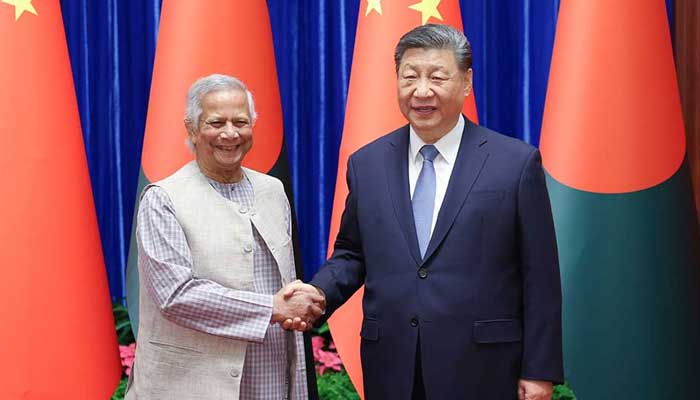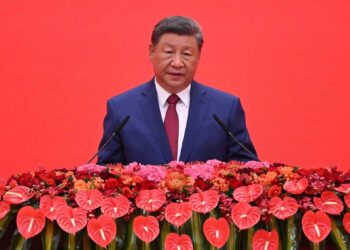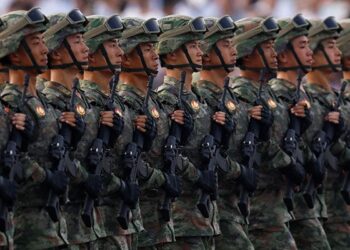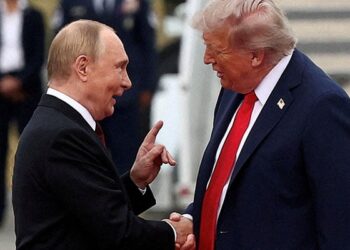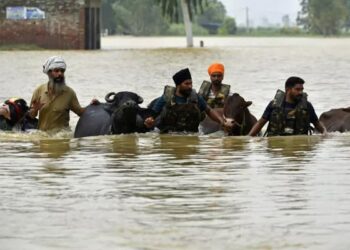Select Language:
Bangladesh’s Diplomatic Shift: Navigating New Alliances
DHAKA: The protests in Bangladesh that led to the government’s collapse last year have sparked a significant diplomatic shift, with the country increasingly aligning itself with China after tensions escalated with India, following the removal of long-time ally Sheikh Hasina.
A year post-protests, this shift has the potential to deepen divisions within Bangladesh as various political factions vie for power ahead of upcoming elections. The interim government faces the challenge of achieving internal consensus to reform democratic institutions in a nation of 170 million.
Praveen Donthi, an analyst with the International Crisis Group in New Delhi, remarked, “The strain on India-Bangladesh relations has likely reached unprecedented levels.”
Many in Dhaka harbor resentment over the ex-prime minister Hasina’s escape during the student-led uprising in August 2024, when she was evacuated by helicopter as protesters stormed her palace. Interim leader Muhammad Yunus noted that the anger of the predominantly Muslim population of Bangladesh has been redirected towards India, especially since Hasina sought refuge in New Delhi.
Hasina, now 77 years old, has ignored extradition requests to stand trial for crimes against humanity and has already been sentenced in absentia for contempt of court.
A “Readjustment” Phase
Md Touhid Hossain, head of Bangladesh’s foreign ministry, characterized the current diplomatic environment as being in a “readjustment stage.” Nobel laureate Yunus made his first official visit to China in March, during which he secured $2.1 billion in investments, loans, and grants. Additionally, Beijing has actively reached out to prominent political figures.
Mirza Fakhrul Islam Alamgir, a senior member of the Bangladesh Nationalist Party (BNP), which is poised to lead in the upcoming elections, stated that China is eager to collaborate with the next elected government with “sincerity and support.”
India remains cautious of China’s escalating influence in the region, especially as both nations compete for power in South Asia, despite recent diplomatic improvements. Bangladesh has also been strengthening ties with Pakistan, traditionally seen as India’s arch-rival.
In May, escalated military conflicts between New Delhi and Islamabad resulted in over 70 deaths within just four days, ignited by a militant assault on civilians in Indian-occupied Kashmir. Following this, officials from Bangladesh and Pakistan convened in China to discuss cooperative initiatives.
Chinese foreign ministry spokesperson Guo Jiakun confirmed that the three nations agreed on various collaboration programs covering trade, industry, education, and agriculture.
Md Obaidul Haque, an international relations lecturer at the University of Dhaka, emphasized that dialogue with China has reaped rewards, particularly in healthcare, after restrictions limited access to medical tourism in India. “For instance, China has designated three hospitals specifically for Bangladeshi patients,” he explained.
Cautious Alliances
Bangladesh and Pakistan initiated maritime trade last year and are planning direct flights, raising concerns in New Delhi. Donthi opined that the current Indian government, with its ideological stance, is resistant to recognizing Dhaka under a regime viewed as Islamist and antagonistic.
Both nations have imposed trade restrictions on each other. India, which nearly surrounds Bangladesh, has tightened import regulations on items such as jute fibers and textiles. However, Md Humayun Kabir, a former Bangladeshi ambassador, pointed out that trade levels remain high, calling for prudence in alliance-building. He advised that Dhaka should carefully navigate its partnerships while fostering multilateral relations.
“While cooperation persists, the previously cordial atmosphere has faded,” he noted.
Future Tensions and Resolutions
Additionally, Bangladesh, being the world’s second-largest garment exporter, faces challenges stemming from global market shifts, notably after the tariffs set by former U.S. President Donald Trump. In efforts to mitigate the trade deficit, Dhaka is looking to purchase Boeing aircraft and increase imports of U.S. goods like wheat and cotton.
Despite these efforts, experts warn that the regional dynamics are unlikely to shift in the near future, with potential for further escalation. Donthi articulated, “A change will only occur if New Delhi feels satisfied with the electoral process and comes to terms with the political situation in Dhaka.” He further indicated that there might be attempts to undermine the current government rather than seeking collaboration.

